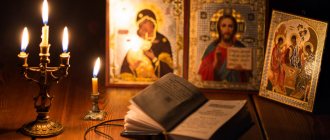25.02.2021, 01:18
Morning and evening prayers are a set of prayers that a Christian should read twice a day: after sleep and immediately before it.
Morning and evening prayers are necessary in order to remember God, His love and commandments. They were written by saints who had spiritual experience and practice, and became widespread in the 18th-19th centuries. Morning and evening prayers can be read silently or aloud, in part or in full - each person makes his own decision (you can ask a priest or spiritual mentor for advice). You can pray at other times - this prayer book has a “universal” meaning.
Why are rules needed?
Experienced Christians know them by heart, but every Orthodox person should have a “Prayer Book” filled with texts of proclamations not only for morning and evening, but for all occasions.
A prayer rule is a list of prayers. There is a general order of sacred reading for morning and evening. In each individual case, the spiritual mentor adjusts the prayer law, taking into account the degree of employment of the person, his place of residence and spiritual age.
Prayer Rule
Often, new believers rebel against reading texts written by saints in a language that is difficult to read. The prayer book was written on the basis of appeals to the Lord of people who accomplished the feat of faith, lived in purity and worship of Jesus Christ and were led by the Holy Spirit.
The first example, which became an integral part of the prayer rule for morning and evening prayers, was given to His followers by the Savior Himself. “Our Father” is the main proclamation with which Orthodox believers begin and end the day. Daily reading of the prayer book becomes a habit that fills the soul with God's wisdom.
About important church prayers:
- Prayer “Virgin Mother of God, Rejoice”
- Prayer to the Holy Spirit “Heavenly King”
- Prayer “Creed” at the baptism of a child
The Church offers a prayer rule for beginners, so that the infant soul in Christianity grows in actions pleasing to the Creator.
A daily conversation with the Creator is a living communication, not an empty phrase. The boldness of communication with the almighty God involves speaking in the right words, in which there is no emptiness.
Important! By turning to the Almighty, the Orthodox are then filled with God's knowledge and His protection, when they leave vanity and are completely immersed in prayer.
Main sections of the Prayer Book
| Text | Download civil font .DOC | Download civilian font PDF | Download in Church Slavonic PDF |
| Morning prayers | |||
| Memorial | |||
| Prayers for the future | |||
| Three-canon (United canons to the Lord, the Mother of God and the Guardian Angel) | |||
| Canon of repentance to our Lord Jesus Christ | |||
| Canon of prayer to the Most Holy Theotokos | |||
| Canon to the Guardian Angel | |||
| Following to Holy Communion | |||
| Prayers of Thanksgiving after Communion | |||
| Clocks and Fine | |||
| Troparions, kontakia and magnifications for the feasts of the Lord, the Theotokos, and great saints | |||
| Troparia, kontakion and magnification of the icons of the Mother of God | |||
| Troparions, Theotokos and Sunday Kontakia in eight voices | |||
| Troparions and daily kontakia for the entire week | |||
| Troparions, kontakia and magnifications common to saints | |||
| A memorial service for the laity to read | |||
| Canon about the deceased (deceased) | |||
| Litia (end of the memorial service and funeral canon) | |||
| Prayer for accepting prosphora and holy water | |||
| Prayer before leaving home | |||
| Prayer of the Optina Elders | |||
| Prayers before and after meals | |||
| Prayers of thanksgiving | |||
| Invoking the help of the Holy Spirit for every good work | |||
| Prayer before starting and at the end of any task | |||
| Prayer for travelers | |||
| Prayer by agreement | |||
| Fifth Number Prayers | |||
| Theotokos rule | |||
| Order of 12 Psalms | |||
| Rule against desecration | |||
| Various prayers (as needed) | |||
| Polunoshnitsa Everyday | |||
| Polunoshnitsa Saturday | |||
| Midnight Resurrection with the Canon of the Trinity | |||
| Small Compline with the Canon of the Mother of God |
How to behave correctly during prayer communication
Prayerful communication of all Orthodox Christians is performed standing; only elderly and sick people can sit. While reading the prayer book, in recognition of their sinfulness and imperfection, showing humility, people bow, some to the waist, while others bow to the ground.
Prayerful communication with God
Some Orthodox believers perform prayer communion while kneeling. The holy apostles opposed such worship, explaining that only slaves kneel; children do not need to do this. (Gal. 4:7) However, having committed some sin, it is not forbidden to kneel in submission, begging for forgiveness.
About prayer rules:
- Prayer rule of Seraphim of Sarov for the laity
- Evening and morning prayers
- Schema nun Antonia's prayer rule about murdered babies
Beginning believers sometimes do not know how to correctly make the sign of the cross. The fingers of the right hand should be folded as follows:
- press the little finger and ring finger to the palm, they mean that Jesus was God and man at the same time;
- put the thumb, index and middle fingers together, three-fingered, as a symbol of the unity of the Father, Son and Holy Spirit.
How to be baptized correctly
Drawing a cross in the air, touch the middle of the forehead with folded fingers, then lower the hand just below the navel, move to the right and then the left shoulder, only after this they bow.
A careless attitude to the sign of the cross, according to John Chrysostom, causes joy only among demons . The sign of the cross, performed with faith and reverence, is filled with God's grace and is a terrifying force for demonic attacks.
Before reading spiritual texts, you should try to free yourself from vain thoughts; this is sometimes difficult, so try to imagine the great sacrifice of Christ and your presence before Him in this world.
Never perform your prayers “for show”; in the spiritual world they will be an empty phrase. Delve into every word of the appeal to the Savior, filling yourself with His grace and love.
Advice from Feofan the Recluse
Saint Theophan the Recluse systematized recommendations for reading the prayer rule as follows:
- Never read hastily, but read as if in a chant. In ancient times, all prayers read were taken from the psalms. But I don’t see the word “read” anywhere, but “sing” everywhere.
- Delve into every word and not only reproduce the thought of what you read in your mind, but also arouse the corresponding feeling.
- To trigger the urge to hastily read, make sure you don’t just read this or that, but stand for a reading prayer for a quarter of an hour, half an hour, an hour - however long you usually stand. And then don’t worry about how many prayers you read, but when the time has come, if you don’t want to stand any further, stop reading.
- Having put this down, however, do not look at the clock, but stand in such a way that you can stand endlessly: your thought will not run ahead.
- To promote the movement of prayerful feelings in your free time, reread and rethink all the prayers that are included in your rule - and feel them, so that when you begin to read them according to the rule, you know in advance what feeling should be aroused in your heart.
- Never read prayers without interruption, but always break them up with personal prayer, with bows, whether in the middle of the prayers, or at the end. As soon as something comes to your heart, immediately stop reading and bow. This last rule is the most necessary and most necessary for cultivating the spirit of prayer. If some other feeling is very important, you should be with it and bow to it, and leave the reading. So until the very end of the allotted time.
Morning and evening prayer rules are spiritual hygiene necessary for every believer. Everyone is commanded to pray without ceasing. The Holy Fathers have a colorful comparison for this: if you churn milk, you will get butter, and in prayer, quantity turns into quality.
It is necessary to pray with a straight back, standing, turning your face to the images. But in a person’s life there are different situations and physical conditions. It is not always possible to stand calmly, without pain in the back or legs, for all the time allotted for the morning rule. Is it possible to read morning and evening prayers while sitting and to whom? For whom is the exception made first?
The tradition of morning and evening prayers is found only in Christian churches belonging to Russian churches. The novices at the monasteries worked hard all day for 12-14 hours. They prayed before going to work and in the evening before meals. Gradually, the image of first a Christian believer, then an ideal family, emerged.
Archpriest Sylvester, in his book “Domostroy” at the beginning of the 18th century, described how an exemplary family in the morning and evening in its entirety, including children and servants, lines up in front of the icons and diligently repeats all the prayers after the head of the family.
The tradition of morning prayer is also associated with turning to God for the blessing of the day that has begun and its favorable course. In the evening, a prayer of gratitude is offered for the day, the gift of bread, health, and good luck.
Prayer Rule - Law or Grace
Many novice Orthodox Christians are interested in the question: if prayer is a free appeal to the Creator, then why make it conform to the law.
In response to such an appeal, the Saratov abbot Pachomius clarifies that freedom and permissiveness should not be confused. The freedom of believers consists in the boldness of being before the throne of the Most High, which sinners and the unbaptized cannot afford. Permissiveness returns the believer to his former life, and it is then much more difficult to return to the grace of appeals to the Savior.
In the spiritual world there is no consensus regarding the duration and order of prayer before the Almighty. Some people remain in reverent worship for hours, while others cannot stand even half an hour.
Regular, constant spending time reading prayers will help you develop the habit of daily communication with the Creator, even if it’s 15 minutes in the evening.
Prayer Rule
First, you should purchase a “Prayer Book” and read it. Sometimes an Orthodox person understands that reading out of obligation turns into an empty habit; if this happens, then one can move on, as St. Theophan the Recluse did, to reading psalms and scriptures from the Bible.
The main thing is to be filled with worship of the Creator every day, to enter His presence, to feel His protection throughout the day. Evangelist Matthew wrote that to conquer the Kingdom of God you need to use force. (Matt. 11:12)
To help the beginning prayer book
There are three prayer lists for Orthodox believers.
- The complete prayer rule is designed for spiritually persistent believers, which include monks and clergy.
- The prayer rule for all laity consists of a list of prayers read in the morning and evening; a list of them can be found in the “Prayer Book”:
- in the morning: “Heavenly King”, Trisagion, “Our Father”, “Virgin Mother of God”, “Rising from sleep”, “Have mercy on me, O God”, “I Believe”, “God, cleanse”, “To You, Master”, “ Holy Angel”, “Most Holy Lady”, invocation of saints, prayer for the living and the dead;
- in the evening: “Heavenly King”, Trisagion, “Our Father”, “Have mercy on us, Lord”, “Eternal God”, “Good King”, “Angel of Christ”, from “The Chosen Governor” to “It is worthy to eat”.
Seraphim of Sarov proposed another short prayer rule for those laity who, for some reason, are limited in time or are in unpredictable circumstances.
Icon of Seraphim of Sarov
It consists of reading each prayer three times:
- "Our Father";
- “Virgin Mother of God, rejoice”;
- "I believe."
Particular attention should be paid to reading spiritual appeals to the Almighty Creator and Savior during the period of fasting, before receiving the Sacrament of Communion and in the hour of difficult life trials.
Advice! God's mercy accompanies those who began communicating with God in the morning, before breakfast, and ended by reading spiritual texts before dinner.
Moral preparation for worship
For a beginning Orthodox believer, it is advisable to purchase a “Prayer Book” in modern Russian, so that while reading what is written, delve into every word, filling it with strength and grace, and receive instruction and support.
This is the advice of Nicodemus the Holy Mountain, which points out the importance of understanding every word of the text being read. Over time, many texts are stored in memory and read by heart.
Before reading the Prayer Book, you should ask the Holy Spirit to show whether there are any remnants of resentment, bitterness or irritation in your heart. Mentally forgive all offenders and ask for forgiveness from those who were treated unfairly, this is how the Orthodox pray.
According to Tikhon of Zadonsk, all negativism should be abandoned, for, as Gregory of Nyssa wrote, the Creator is Kind, Righteous, Patient, Lover of Humanity, Kind-hearted, Merciful, the goal of the prayer rule is to be transformed into the image of the Creator, to acquire all the qualities for philanthropy.
What is a prayer rule?
The prayer rule is the daily, regulated reading of special morning and evening prayers, which is performed privately (at home or in a monastery cell), outside of public worship. It is necessary for the rhythm of life, so that the soul does not fall out of the prayer life. It invisibly connects a person with the psalmists and ascetics who created him. It helps create the right spiritual mood.
The prayer rule can be different:
- general - obligatory and the same for everyone;
- individual - a special, private confessor selected taking into account the spiritual state, employment and strength of the believer.
Theophan the Recluse recommended calculating the prayer rule not by the number of prayers, but by the time that a person is ready to devote to God. For a worldly person, sometimes even 5 minutes of morning and evening prayer is enough to be a real Christian. The main thing is to pronounce it with attention and feeling.
Reading prayers at home
Jesus Christ taught to communicate with Him to go into your prayer room, closing the doors from the outside world. Every Orthodox family has a corner with icons, although it is increasingly rare to see an icon lamp there.
Red corner in the house
Before starting to worship God, you should light a candle; it is advisable to purchase it in the temple. In a family, and this is a prototype of the church, there are rules for who prays in solitude, and some prefer to do it together, because the intense prayer of a righteous person can do a lot. (James 5:16)
Theophan the Recluse, who spent a lot of time worshiping God, writes that there is no need to rush when starting to pray. Having made the sign of the cross and bowed, you should be silent for a moment, entering a state of worship and reverence before God. Every word of prayer must come from the heart; it must not only be understood, but also felt.
Reading "Our Father";
- give praise to the Creator who is in Heaven;
- submit your life to His will;
- truly forgive the debts and misdeeds of other people, for these are prerequisites for God to forgive each of the Orthodox;
- ask Him for mercy in solving all material problems with the words “give us this day our daily bread”;
- Declare the power of God in your life and His covering over you and your family.
If, while reading the “Prayer Book,” a desire appears in your heart to ask God for some need, do not put it off until later, but immediately bring it before the prayer throne of the Almighty.
The Lord teaches His children to be constant and persistent in prayer through the example of a poor widow (Luke 18:2-6); no petition will remain unanswered by Him. It is very important when communicating with the Savior to put aside all haste; only through a meaningful appeal can one reach God.
According to the advice of Bishop Anthony, in order not to be distracted by time limits, you should wind the clock so that the bell rings at the right moment. It doesn’t matter how long the prayer rule lasts or how many prayers are read, the main thing is that they are completely dedicated to God.
Saint Ignatius calls regular prayers hard work for sinners, while the righteous experience pleasure from communion with the saints and the Trinity.
If thoughts “run away”, there is no need to rush, you should return to where you began the absent-minded reading of the spiritual proclamation and start all over again. It will help to concentrate on the text being read by saying all the appeals out loud. It is not without reason that they say that prayers read silently are heard by God, and prayers spoken out loud are heard by demons.
Silouan of Athos noted that God does not hear words spoken in empty thoughts and worldly affairs.
Silouan of Athos
The spirit of prayer is strengthened by regularity, just as the body of an athlete is strengthened by training. Having finished your prayer, do not immediately “pounce” on worldly vain affairs, give yourself a few more minutes of being in God’s grace.
How to read correctly? Recommendations
In order for the prayer rule to be extremely beneficial, it must be read correctly, in accordance with the recommendations of the holy fathers of the Russian Orthodox Church.
- You cannot skip prayer rules either in the morning or in the evening.
- Know the basic prayers by heart so that they penetrate deeper into your heart. This will allow you to read them in any circumstances (for example, on a trip, if you forgot your prayer book).
- Study the translation of prayers from Church Slavonic into Russian in order to understand each word and put meaning into it.
- Before reading the prayer rule, remove resentment, bitterness and irritation from your heart.
- Read the morning prayer rule before starting any task.
- During prayer, sit alone, light a lamp or candle, stand in front of the icon, make the sign of the cross, make several bows or bows to the ground, and tune in to an internal conversation with God.
- You should not limit yourself to just praying for loved ones. You also need to pray for those who have caused grief.
- End the prayer rule with thanksgiving to God.
It is also recommended to read the prayer rule with the whole family. A common prayer is said before and after meals.
When can you pray sitting and lying down?
During the day a person works and performs other actions. In addition, people are busy around the house and taking care of their children. By evening, some are so tired that it is difficult for them to stand while reading evening prayers. As lay people age, they begin to suffer from various diseases. First of all, these are the legs, they bend, hurt and do not hold up. Praying in a traditional position is problematic. Pregnant women can also pray while sitting, especially if they are pregnant. After all, by standing they tire not only themselves, but also their unborn baby.
In this case, we should remember the words of Ambrose of Optina. He devoted a lot of time to prayers standing on his feet and kneeling. Noting the importance of prayer, its penetration and understanding, he said that it is better for the person praying to sit and think about prayer, comprehend its words, than to suffer from pain and think about his legs.
You should not give in to temptation and read prayers while sitting, lying down, leaning your back on a chair. Such cunning and insincerity will immediately be revealed to God and dialogue will not work.
Weak and sick people often cannot get up or tear themselves away from their bed. They need to pick up the icon and read the rule while lying down. If you don’t have the strength for a full list of texts, limit yourself to the prayers “Lord”, “Our Father”, “Virgin Mother of God, Rejoice” and the texts closest to the soul.
Before communion with a sick person at home, the priest reads prayers of repentance with him and gives him, who is lying down, wine and prosphora. Every layman has the right to the forgiveness of sins and to partake of the body and blood of the Lord, regardless of his physical condition.
If a person does not have the strength or ability to pray while standing, he can do it at his convenience. The main thing is not to forget about the Lord, constantly turn to him with gratitude, magnification and requests, rather than forget about prayers under the pretext of inconvenience.
Here you can receive or find answers from Orthodox priests to questions regarding your spiritual quest or receive spiritual advice on everyday issues.
It’s very simple for an Orthodox priest: In “Elitsy” there is a project “Questions to the Father” https://dialog.elitsy.ru Every Orthodox Christian should improve his knowledge about the Orthodox faith.
On the implementation of morning and evening rules.
Question: “Is it obligatory to read the morning and evening rules from the prayer book? I have two reasons preventing this: firstly, there is no possibility of solitude, and secondly, when I pray in my own words from the heart, the prayer turns out to be more heartfelt, and not purely mechanical. I don’t remember where I heard about the rule of Seraphim of Sarov: Our Father - three times, the Virgin Mary - three times, the Creed. So, I read this rule in the evenings, I pray a little on my own, and in the morning I find more and more, combining it with chores around the house. Is it possible to do this, or is it necessary to read all the established prayers?”










